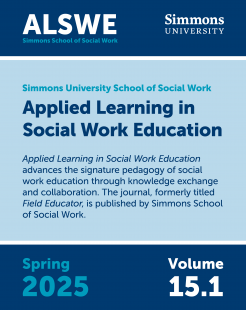Dear Readers,
We are excited to publish the first issue of our newly renamed journal, Applied Learning in Social Work Education (ALSWE). The change marks a new chapter in our journal’s evolution, and reflects our continuing commitment to promoting research and knowledge exchange among social work educators. ALSWE will build on the legacy of Field Educator by continuing to focus on fostering dialogue and disseminating social work research that we hope inspires innovation and change.
Read more…
Abstract
The study examines the demanding role of field supervisors in the Bachelor of Community Development program, an adaptation of social work field education, at an urban University in South Africa. Using qualitative interviews with nine supervisors of third-year and honors students, the research highlights challenges such as inadequate training and insufficient resources. Through a systems theory lens, the study underscores the importance of effective communication in field instruction. Recommendations include implementing comprehensive training programs for supervisors to enhance their skills and capabilities, addressing the significant but often overlooked challenges they face.
Keywords: field instruction; supervision; community development and leadership; training
Read more…
Abstract
Social work practicum education can involve additional challenges for students of color. This study explored the practicum experiences of Black students and other students of color. The study involved four focus groups of MSW and BSW practicum students (N = 15) in a Southeastern state. Focus group transcripts were analyzed using an iterative, inductive coding process. Themes identified in the participants’ practicum experiences included direct and indirect experiences with racism, witnessing clients experience racism, tokenism, and varying support from supervisors. The study results can inform social work educators’ responses to students of color and help foster success for all students.
Keywords: social work practicum; students of color; racism; tokenism; supervision
Read more…
Abstract
The signature pedagogy of social work, practicum education, is crucial for teaching students to respond to complex community needs, which have been intensified by the COVID-19 pandemic. While practicum education is emphasized, there is a lack of structure, focus, and framework of supervision from the Council on Social Work Education (CSWE), leading to significant variations across accredited programs. This lack of consistency may substantially impact interns’ professional growth. This article introduces a conceptual framework integrating Relational Cultural Theory (RCT), trauma-informed principles, and the three roles of professional supervision in practice to strengthen and transform the relationship between the student intern, supervisor, and practicum faculty in postpandemic social work education.
Keywords: practicum education; Relational Cultural Theory; trauma-informed supervision; professional development; postpandemic
Read more…
Literature Review
The Council on Social Work Education (CSWE) recognizes field education as the signature pedagogy of the social work profession (CSWE, 2008, 2015, 2022). Signature pedagogy is a term used to describe the most influential educational strategies within an area of study (Shulman, 2005). In their Educational Policy and Accreditation Standards (EPAS), the CSWE (2022) defines signature pedagogy as “elements of instruction and socialization that teach future practitioners the fundamental dimensions of professional work in their discipline: to think, to perform, and to act intentionally, ethically, and with integrity” (p. 20). Field education, also known as practicum, refers to courses where students demonstrate mastery of the social work competencies in a professional setting (CSWE, 2008, 2015, 2022). Practicum experiences prepare students for practice and provide context for classroom learning (Brzykcy et al., 2016; Lee et al., 2019; Rai, 2004).
Read more…
Katharine Dill, PhD
Marist University
Natalie Beck Aguilera, DSW
St. Edward’s University
Episode 5: Unpaid practicum internships: Issues and answers
Host of The Conversation, Dr. Katharine Dill of Marist University, interviews Dr. Natalie Beck Aguilera of St. Edward’s University. The practice of requiring unpaid practicums in social work education runs counter to the profession’s belief in economic justice. In one study, 80% of students reported that their practicum had a negative impact on their financial situation. Stress associated with the resulting financial hardship has been found to compromise the learning experience, with a disparate impact on low-income students. Social work education programs can leverage multiple approaches to help students access the financial resources they need during their internships.
In 2015, Marion Bogo published a seminal article highlighting contemporary issues in practicum education, which is recognized as the signature pedagogy in social work education (Bogo, 2015). As Professor Bogo’s former doctoral student and collaborator (Bogo & Dill, 2008; Dill & Bogo, 2009), I am deeply influenced by her scholarship and committed to advancing its contemporary application. However, the educational landscape has transformed significantly since Bogo’s publication, largely due to the COVID-19 pandemic. The rapid transition to online education across higher education has diversified instructional modalities, which now include synchronous, asynchronous, and hybrid formats. Previously reluctant to embrace online methods, social work educators now recognize their potential to engage underserved populations, including students from remote areas, working adults, and individuals preferring self-paced learning.
Read more…
